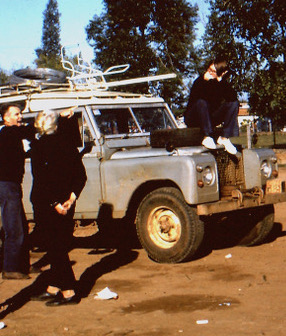(That’s me as a teenager, sitting on one of my Father’s Land Rovers.)
My last blog (Money and My Mennonite Father) described my father as a man obsessed with living frugally.
When I was a kid, I thought we were very poor. I owned one Sunday-best (hand-sewn) dress and one pair of (hand-me-down) shoes. The rest of the time, I ran around barefooted in shabby clothes on my dad’s Paraguayan leprosy hospital compound.
I still remember when my Uncle Herb came to visit us from the States, he brought us small packs of gum that came in bright yellow outer wrappers and silvery inner linings. They were called “Juicy Fruit.” I nibbled off tiny corners of the gum to chew, and saved the rest in the bottom drawer of the cabinet next to my bed. Every day I checked the drawer to make sure my brothers hadn’t found the gum.
Crazy, right? By the time I chewed the last tiny bit of that gum, it was hard and stale.
But that’s the sort of skimpiness our father instilled in us. Centuries of persecution of our forebears, the Mennonites, on account of their faith, often led to poverty and uncertainty, as they fled from the Netherlands, to Prussia, to the Ukraine and finally, to the Americas. And everywhere they went, they stuck to their principles of frugality and a simple life.
As a child, I knew we had to live simply. I didn’t know that in spite of our simple lifestyle, my father still agonized over us having “too much.”
In the 1960s, he wrote, “I’m reaching out to our Paraguayan neighbors, going from hut to hut to oversee the construction of toilets. I’m showing them how to plant gardens and grow vegetables away from their toilets. What’s most important is that we, their neighbors, provide an example of how to live, which we cannot do unless we live simply and frugally. Even then, the difference between have and have-nots is too big, but I recognize that we cannot adopt the extreme poverty I see around us.”
But there were glaring exceptions.
My father frequently acquired new expensive vehicles like Chevy station wagons and Land Rovers for our leprosy station. When he invested in land in the Chaco of west Paraguay, he purchased a pricy bulldozer to clear the dense brush. And when he decided to pack his entire family of eight into a vehicle and drive for three months from Paraguay to his family’s home state of Kansas, he chose to import a brand new Volvo from Sweden for the trip.
I often wondered why it was OK for my father to own expensive vehicles, when he’d taught us that it was sinful to waste money and flaunt the stuff money buys.
I asked him about that a few years before he died. “Dad, why did it never bother you to spend so much money on fancy vehicles?”
“Fancy?” He frowned, as though not remembering.
“Land Rovers. Volvo…?” I prompted.
“Oh, those,” he said, waving his hand as though to dismiss my question. “I needed those.”
I’m quite sure he never perceived this as paradoxical at all.
And then I remember that still today I also often stress over small expenses I’d like to avoid, like parking tickets, for example. And I have a very hard time throwing out even tiny bits of leftover food. By contrast, purchasing large-ticket items like cars or homes is for me a joyous event.
Paradoxical?


Marlena shared with us one of the paradoxes she observed within her father and how a similar paradox consistent with her childhood learning still shows up in her own life.
I believe that what’s unusual is not that those paradoxes exist but that she’s aware of and able to articulate them. It appears to me that many of us spend significant energy attempting to appear internally consistent both to others and ourselves. Possibly those efforts are quite costly.
Mary Todd Lincoln s stylish wardrobe was a source of journalistic gossip, and her extravagant taste in clothes and White House furnishings (particularly in light of national sacrifices during the Civil War) embarrassed her frugal husband.